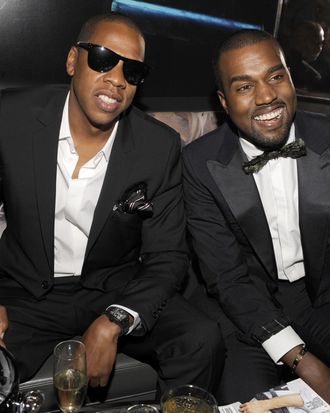

There are a variety of sound and valid reasons for not liking Watch the Throne, the new collaboration between Kanye West and Jay-Z. Many are Kanye-related, and I subscribe to the bulk of them. Have you heard the one about two rappers who dwell on their wealth and power in a moment where other people are watching theirs slip away, while the market’s crashing and London’s in flames? How about their tiresome descent into what’s come to feel like Spider-Man-rap: With great power come great opportunities to act all touchy and beleaguered? (And exotic new things to complain about.) After a few minutes of listening to West and Jay-Z catalogue the burdens of success, you may wish they could at least fast-forward to the point where this stuff becomes a challenge: Can you make some rhymes about property taxes sound hot? How about estate taxes, or that private-jet-exemption thing Obama kept talking about a while back?
But let’s brush over that part of things (and the supremely patience-trying part of Kanye) and fast-forward to something else — the theme of the throne. This is an album, after all, about the relationship of black American men to wealth, power, and success. As created by two men who approach those things in different ways: Jay-Z the poised, projects-raised hustler, for whom self-controlled savvy is the thing, and Kanye the middle-class kid who struggles mightily with the concept of self-control and is happy to be a big messy ball of emo instead; Jay-Z the quietly potent mentor/big brother who has chats with the president, and Kanye the loud-mouthed hyperactive student/little brother whom the president calls a jackass. Both of whom have reached — or are expected to behave as if they’ve reached — previously unthinkable levels of success.
Such levels of success that on “Made in America” they invoke heroes of the civil rights movement (the Kings, Malcolm and Betty, a righteous god) to reflect on how they’ve seized what might be an American Dream. (Jay-Z on the drug-dealing that got him started: “Our apple pie was supplied by Arm & Hammer” — his skill at baking double- and triple-meanings into a line is on full display here. Kanye describes his original hustle in terms of … blogging and web traffic.) Such levels of success that Jay-Z starts the most pointed track, “Murder to Excellence,” by contrasting these rappers’ world with the violence still surrounding too many other black men — and underlining some sense of loneliness that comes with it. (“Only spot a few blacks the higher I go,” he says. “In the past, if you picture events like a black tie,” says Kanye, “what’s the last thing you expect to see? Black guys.”) Kanye’s started to have a strange relationship with the idea of old-world aristocracy; Jay-Z collects fine art. Occasionally they seem to be working in parallel with a piece by the British-Nigerian artist Yinka Shonibare: Diary of a Victorian Dandy, in which the artist luxuriates in all the genteel pleasures of the time.
This is a great and important topic to document, the kind of thing that might wind up feeling far more striking and relevant years into the future. It’s a portrait of two black men thinking through the idea of success in America; what happens when your view of yourself as a suppressed, striving underdog has to give way to the admission that you’ve succeeded about as much as it’s worth bothering with; and how much your victory can really relate to (or feel like it’s on behalf of) your onetime peers who haven’t got a shred of what you’ve won. It’s not a topic that deserves to be scrubbed up, either; there are things about Kanye’s tiresome self-involvement and moody debauchery — the way he sounds like some sullen hip-hop emperor, stalking around the crumbling gilded palace of his own psyche, muttering angrily and getting aggressive with the help — that belong in any such portrait.
But it might be a topic that deserves a different album, or a better album, or one with the luck to come across as a bit less of a pure entertainment event. Don’t get me wrong; the music here is reliably good. If Jay-Z seems vaguely secondary — the pairing feels more 70-30 than 50-50 — it’s because the sound leans toward West’s arty tastes, even when the beats are straightforward. There are mildly sullen hooks from Frank Ocean, a shadowy mood hanging over the production, muted palettes and restrained thump, patches of zoomy sci-fi synths. These are good things, for a record that could easily have been filled with over-the-top royal bombast. They’re good things for Jay-Z, too: The project (and Kanye) seems to pull him slightly out of his element, prodding him to drop the all-business vibe and open up. The fact that he’s a no-nonsense married man trading verses with someone who raps about how lines of cocaine look on women’s bodies means he has to think of genuinely meaningful and potent things to say.
It could be so much better, more pointed, more coherent, more in the spirit of living up to the giant topic it winds up revolving around. But this is the thing about documents of a moment; you don’t really get to choose them that way. It’s remarkably strange: Right now, this is just a reasonably good album, but it’s my honest suspicion that 50 years from now, it’ll make for a much more fascinating time capsule — a strange crystallized moment in the story of new black wealth and power and questions of assimilation in a Post-Civil-Rights America.

